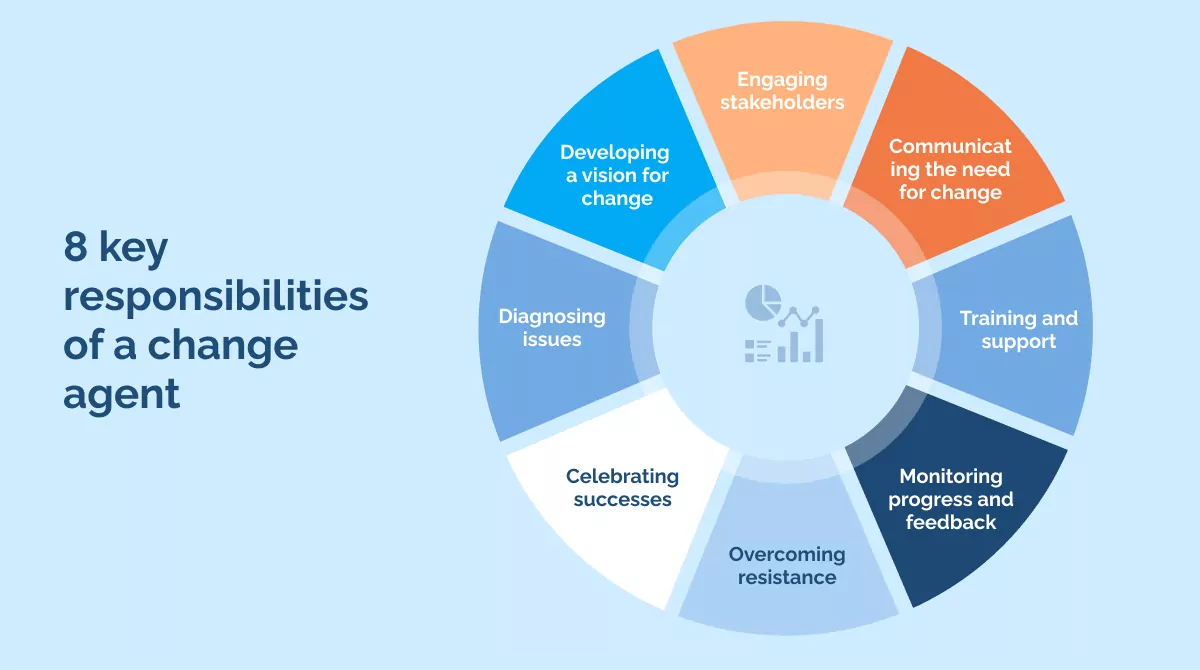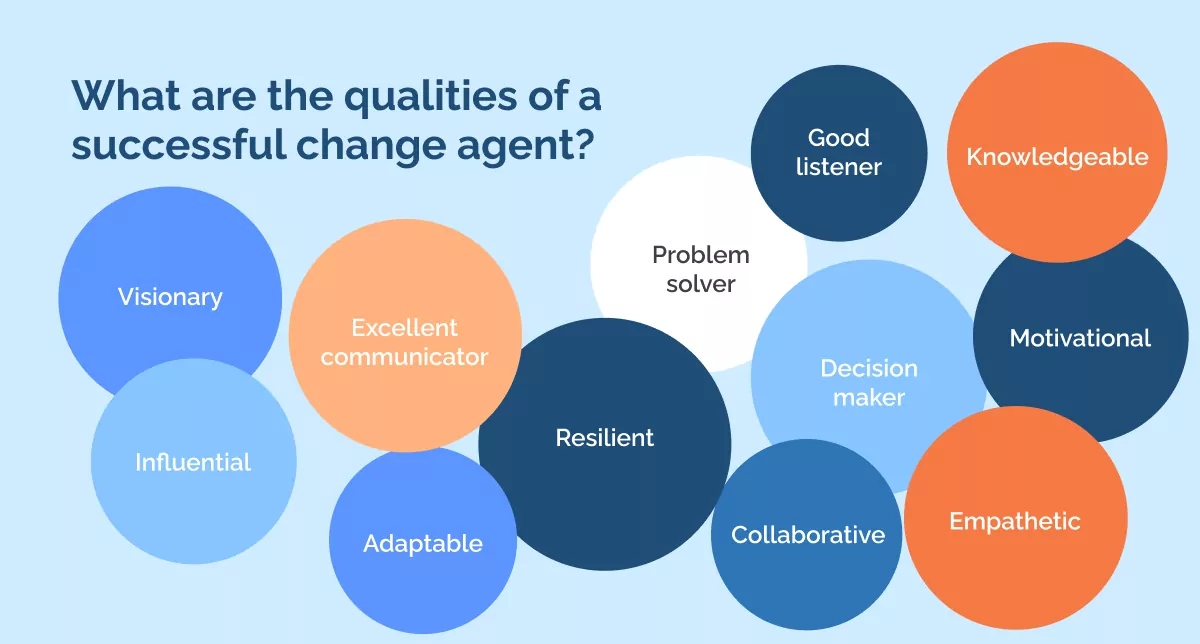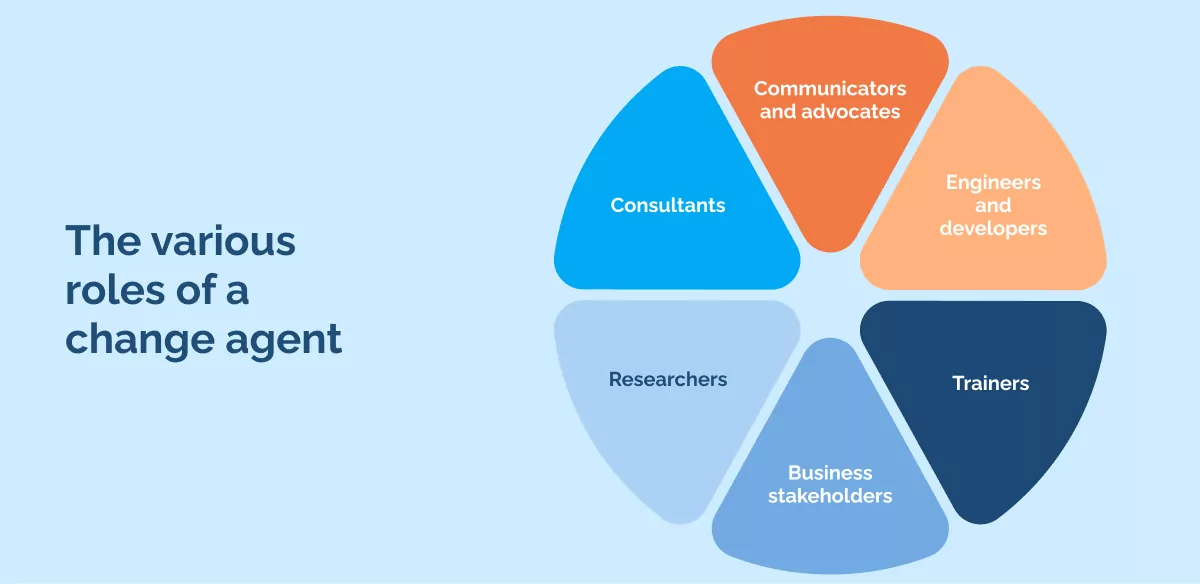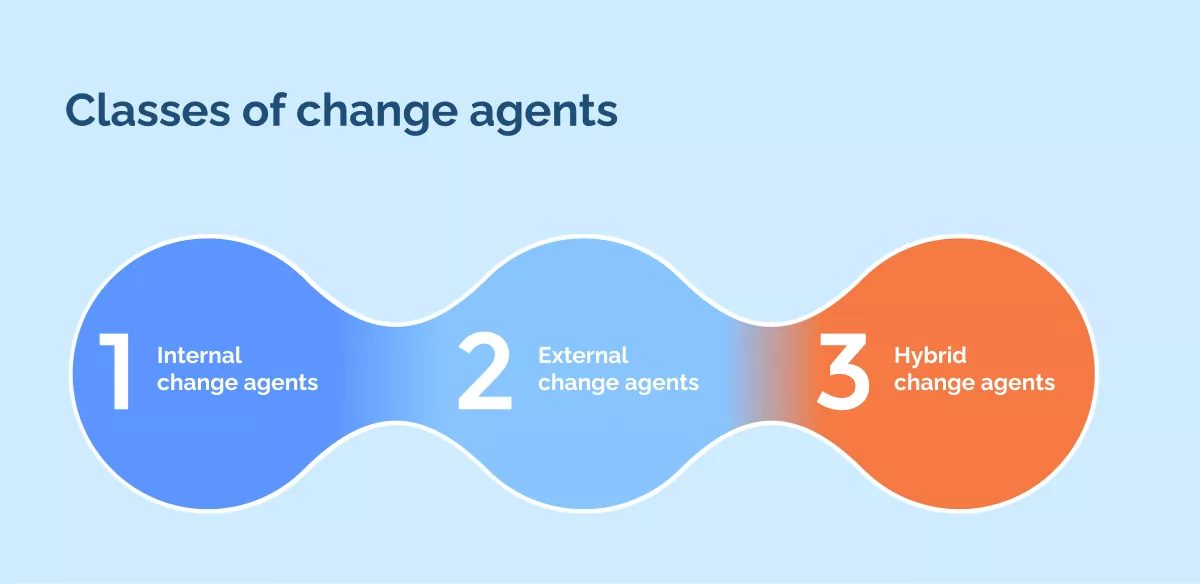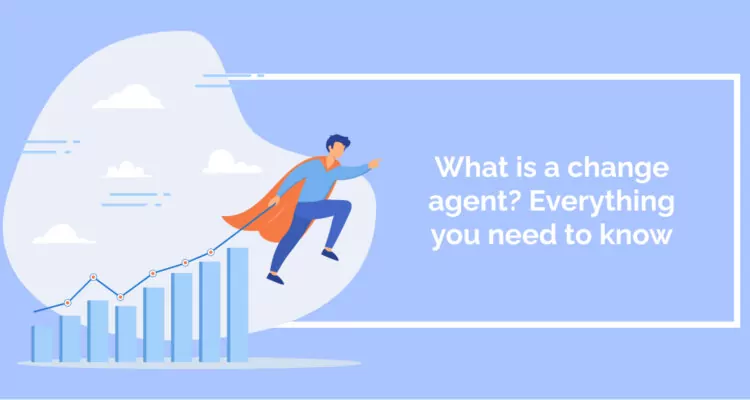
A change agent is someone within your organization who helps to drive change from the inside. They do this by promoting and enabling change at every stage.
Change agents inspire at the start of an initiative, guide during the implementation process, and champion changes after they go live.
A change agent is not the same thing as a change manager.
A change manager is responsible for designing and implementing change officially, whereas a change agent facilitates changes that a change manager has designed.
Change agents can be at any level of an organization, from C-suite to front-line staff.
Change agents do many different things in an organization, and they’re an essential piece of the puzzle of digital change management.
And it pays to invest in change agents- 47% of organizations that integrate change management are more likely to meet their objectives than the other 30% that did not incorporate it.
In this article, we’re breaking down everything you need to know about the change agent role.
From what change agents do, to how they can impact a change project and what traits make a great change agent.
By the time you’re done reading, you’ll be prepared to begin harnessing the power of change agents to drive change within your organization.
What is a change management agent?
In the dynamic world of business, a change agent is your catalyst for evolution.
It’s someone who recognizes the need for change, champions it, and works diligently to bring that change to fruition.
When navigating the challenging waters of organizational growth, you need people who not only identify inefficiencies but also rally their teams, propose solutions, and execute plans effectively.
This is where your change agents come into play.
They could be a member of your existing team with an aptitude for forward-thinking and adaptability.
Alternatively, you might bring in an external consultant with a fresh perspective and specialized expertise.
Regardless of their origin, their primary goal remains consistent: To facilitate positive change in alignment with your business objectives.
8 key responsibilities of a change agent
It’s crucial to recognize the breadth and depth of the change agent role if you plan to make use of them in your organization.
Here’s a breakdown of the 8 key responsibilities of a change agent:
- Diagnosing issues: Your change agent actively scans the environment, identifies inefficiencies, and pinpoints areas that need improvement. They’re your business’s health-check expert.
- Developing a vision for change: They don’t just identify problems; they craft a compelling vision for the future. They design roadmaps that lead your organization from its current state to its desired state.
- Engaging stakeholders: Building relationships is vital. Your change agent collaborates with stakeholders at all levels – from team members to top-tier executives – ensuring buy-in and gathering diverse perspectives.
- Communicating the need for change: Articulating the rationale behind change initiatives is a skill. They present facts, tell stories, and use data to convince your team of the urgency and importance of the change.
- Training and support: As new processes or tools are introduced, your change agent ensures that your team has the necessary training and resources. They’re there to answer questions, provide guidance, and offer support.
- Monitoring progress and feedback: Implementing change isn’t a “set it and forget it” affair. Your change agent regularly checks in on the progress, solicits input, and makes necessary adjustments to keep things on track.
- Overcoming resistance: Change often meets resistance. Your change agent works to address concerns, dispel myths, and break down barriers that might impede the transformation.
- Celebrating successes: Recognizing milestones and achievements is key. They’ll celebrate the small wins and the big leaps, ensuring that your team stays motivated and understands the value of their contributions.
Your change agent’s responsibilities are multifaceted and require a unique blend of skills.
Understanding these roles can help you better support them, ensuring your business transformation goes smoothly and successfully.
What are the qualities of a successful change agent?
Change agents are actively involved in managing change in your organization.
When selecting change agents, look out for a balance of the following qualities and traits:
Visionary: A good change agent can see the bigger picture and clearly understand the desired future state.
Excellent communicator: They can articulate ideas clearly, rally the team behind the vision, and convey the importance and benefits of change.
Influential: Their ability to inspire and persuade others is crucial, especially when encountering resistance.
Empathetic: Understanding and acknowledging the feelings and concerns of others is key. This quality helps in addressing resistance and fostering a supportive environment.
Adaptable: The landscape of change can be unpredictable. The ability to adjust strategies and plans as necessary is essential.
Resilient: Challenges and setbacks are common in change processes. A strong change agent remains persistent, even in the face of adversity.
Problem solver: They can identify challenges quickly and find effective solutions, ensuring the change process remains on track.
Good listener: Listening to stakeholder feedback, concerns, and suggestions helps refine the change process and ensures everyone feels involved.
Decision maker: While collaboration is key, there are times when swift and decisive actions are necessary. A change agent must be confident in making crucial decisions.
Knowledgeable: A deep understanding of the business, its culture, and the external factors affecting it helps craft relevant and effective change strategies.
Collaborative: They can work effectively with teams across various departments, ensuring everyone moves in the same direction.
Motivational: Keeping the team’s morale high and maintaining momentum throughout the change process is vital. A good change agent inspires and energizes others.
The various roles of a change agent
Change agents wear a number of hats.
And as far as most staff are concerned, change agents should be consistently available to answer any queries during a change project.
Understanding these roles will give you a fuller picture of what change agents are capable of- and what you can expect from them.
Consultants
As consultants, change agents provide advice and guidance on implementing change initiatives.
With their knowledge of successful business practices, they provide expertise on best practices and evaluate changes to promote success.
External change agents can assess your organization’s current situation, using an outsider’s perspective to identify problems that might be unclear to internal employees and leaders.
Communicators and advocates
Before, during, and after a change initiative, communication across your organization is vital to a project’s long-term success.
As communicators, change agents are responsible for providing clear and concise information about changes to all stakeholders.
They ensure everyone is informed of the changes’ nature, scope, and objectives.
Change agents also play an important role in creating a shared understanding of your organization’s goals among employees.
Engineers and developers
Change agents can show you how to overcome technical obstacles in a digital transformation project.
A change agent with a software engineering and development background can be a valuable asset when a change project involves significant technological change.
A change agent doesn’t always need complete technical oversight of a project, but when they understand the ins and outs, they can better support the journey.
Trainers
As trainers, change agents equip employees with the knowledge and skills to respond to changes successfully.
They offer support for those feeling overwhelmed by the process and ensure everyone knows their roles in achieving the organization’s desired outcomes.
Change agents can help you deliver more effective employee training, whatever form that training takes.
Business stakeholders
As business stakeholders, Change agents try to build consensus among all other stakeholders, negotiating differences in opinion and providing advice when needed.
They ensure that every decision made is aligned with your organization’s overall objectives and be able to communicate these decisions to everyone involved effectively.
Researchers
As researchers, change agents collect data to better understand the current state of your organization.
They use this information to identify improvement opportunities and suggest solutions based on sound evidence.
Through their research, they also assess the effectiveness of organizational changes and provide feedback that can be used to make adjustments.
Finally, they identify external trends affecting the organization and its processes.
Classes of change agents
Understanding the different classes of change agents can help you determine who to engage for various initiatives when dealing with organizational change.
The classes of change agents typically fall into three main categories:
Internal change agents
These can be leaders and executives within your organization who initiate and lead change. Their authority and influence can be instrumental in large-scale transformations.
Sometimes, the catalyst for change comes from within the ranks instead of from leadership. Employees at various levels might recognize the need for change and take the initiative to advocate for it.
They often have unique insights and intimate knowledge of specific areas that might require improvement.
External change agents
These are specialists you hire from outside the organization who have specific expertise in the areas you’re looking to change.
They bring an external perspective and may have experience managing similar changes in other organizations.
Sometimes, changes require highly specialized knowledge. Engaging industry experts ensures you leverage best practices and state-of-the-art expertise tailored to your field.
You can also collaborate with educational or research institutions, who can provide cutting-edge insights, especially if your change involves innovation or technology adoption.
Hybrid change agents
comprising both internal and external members, these teams combine the best of both worlds.
Internal members provide in-depth knowledge of your organization’s culture and needs, while external members bring fresh perspectives and specialized expertise.
As you plan and execute change initiatives, considering these classes of change agents allows you to tailor your approach based on the specific needs and nature of the change.
Whether it’s a minor process improvement or a complete organizational transformation, selecting the right class of change agents ensures you have the expertise, perspective, and influence needed to succeed.
Change agents: The key to longevity in change?
Only 34% of change initiatives succeed. Could it be that change agents are the key to improving that figure?
In the dynamic realm of business, change isn’t just inevitable; it’s a driving force behind innovation and growth.
As you navigate the complexities of organizational transformation, understanding the pivotal role of change agents becomes paramount.
Whether they emerge from within your ranks or are sought externally, these individuals or teams possess a unique blend of vision, expertise, and influence. They serve as catalysts and guides, steering your business through challenges and new horizons.
By recognizing the different classes of change agents and aligning them with your specific needs, you position your organization for more streamlined, effective, and successful transitions.
Remember, in the journey of change, the right companions make all the difference. Embrace change agents as your allies, and together, chart the course for a brighter, more adaptive future for your business.
WalkMe Team
WalkMe spearheaded the Digital Adoption Platform (DAP) for associations to use the maximum capacity of their advanced resources. Utilizing man-made consciousness, AI, and context-oriented direction, WalkMe adds a powerful UI layer to raise the computerized proficiency, everything being equal.

